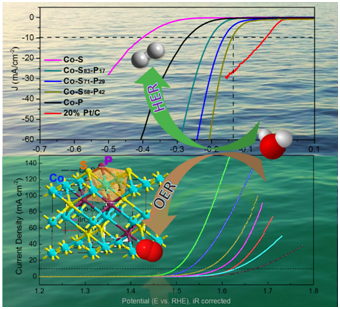The depletion of traditional fossil fuels and environmental pollution have become common challenges facing the world today. As a high energy density, non-toxic and clean energy, hydrogen is widely considered as one of the promising energy sources in the future. Electrocatalytic hydrogenation is the most effective candidate for the preparation of high purity hydrogen. The development of cheap, highly efficient, non-precious hydrogen evolution electrocatalysts is crucial for the above issues, and is currently the subject of academic research.

Recently, Dr. Zhengfei Dai (Distinguished research fellow) from the Laboratory of Surface Engineering (MSE, XJTU) and Professor Qingyu Yan from Nanyang Technological University (Singapore) jointly designed and developed a highly efficient and stable electrocatalyst, a nonstoichiometric pyrrhotite-type cobalt monophosphosulfide material (Co0.9S0.58P0.42) with a hexagonal close-packed phase, for overall water splitting. By regulating the degree of sulfurization, the P/S atomic ratio in the cobalt monophosphosulfide can be tuned to activate the Co3+/Co2+ couples. The synergy between the nonstoichiometric nature and the tunable P/S ratio results in the strengthened Co3+/Co2+ couples and tunable electronic structure and thus efficiently promotes the oxygen/hydrogen evolution reaction (OER/HER) processes toward overall water splitting. Especially for OER, the Co0.9S0.58P0.42 material, featured with a uniform yolk–shell spherical morphology, shows a low overpotential of 266 mV at 10 mA cm–2 (η10) with a low Tafel slope of 48 mV dec–1 as well as high stability, which is comparable to that of the reported promising OER electrocatalysts. Coupled with the high HER activity of Co0.9S0.58P0.42, the overall water splitting is demonstrated with a low η10 at 1.59 V and good stability. This study shows that phase engineering and composition control can be the elegant strategy to realize the Co3+/Co2+couple activation and electronic structure tuning to promote the electrocatalytic process.
The above results were published in ACS Nano, a famous journal with an impact factor of 13.942, titled as "Hexagonal-Phase Cobalt Monophosphosulfide for Highly Efficient Overall Water Splitting". Dr. Dai is the first author, and State Key Laboratory for Mechanical Behavior of Materials, XJTU is the 1st affiliation of this published work.
Full Text Link:http://pubs.acs.org/doi/abs/10.1021/acsnano.7b05050


